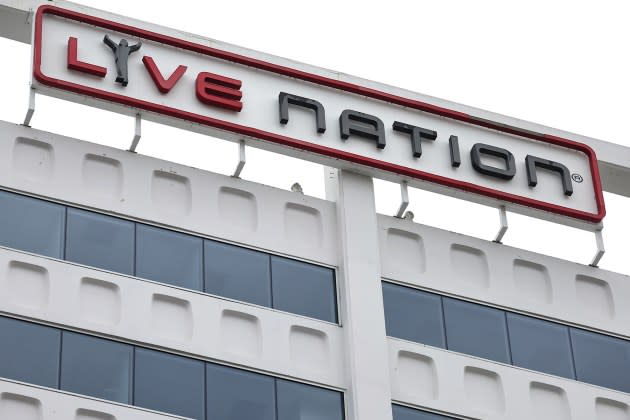10 More States Join DOJ’s Live Nation Monopoly Lawsuit

Ten more states have joined the Department of Justice’s antitrust lawsuit against Live Nation, according to an amended complaint the DOJ filed Monday morning, marking a total of 39 states as well as the District of Columbia to have sued the concert and ticketing giant over the DOJ’s monopoly claims.
Iowa, Kansas, Louisiana, Mississippi, Nebraska, New Mexico, South Dakota, Utah and Vermont all joined the suit Monday, per the amended complaint. The states that have held out on the lawsuit so far are Alabama, Alaska, Delaware, Georgia, Hawaii, Idaho, Kentucky, Maine, Missouri, Montana and North Dakota.
More from Rolling Stone
Former White Party Dancer Files Police Report Against Sean Combs in Miami
The-Dream Calls Sexual Assault Lawsuit 'False and Defamatory'
The amended complaint comes nearly three months after the DOJ first sued Live Nation at the end of May, with the Justice Department calling to break up the 2010 merger that brought Live Nation and Ticketmaster under the same roof.
“We are not here today because Live Nation-Ticketmaster‘s conduct is inconvenient, or frustrating. We are here because as we allege that conduct is anti-competitive, and illegal,” Attorney General Merrick Garland said during a press conference in May. “We allege that Live Nation has illegally monopolized markets across the live concert industry in the United States for far too long. It is time to break it up.”
As Jonathan Kanter, assistant attorney general overseeing the antitrust division said: “The live music industry in America is broken because Live Nation-Ticketmaster has an illegal monopoly. Our antitrust lawsuit seeks to break up the Live-Nation-Ticketmaster monopoly, which will restore competition to the benefit of fans and artists alike.”
The Justice Department alleged in the suit that Ticketmaster used longterm exclusivity agreements with concert venues to stifle competition, further claiming that Live Nation retaliated against venues who didn’t use Ticketmaster as their exclusive ticket provider. The DOJ also alleged that Live Nation worked closely with venue development company Oak View Group to keep from competing with each other and help get more venues using Ticketmaster.
In the amended complaint, the DOJ said that Ticketmaster’s exclusivity deals with venues “have allowed them to limit venues’ and artists’ options and impose supra-competitive fees on fans because there are no meaningful alternatives.”
“This lack of competitive pressure has also disincentivized Defendants from investing in quality and innovation in ticketing,” the amended complaint said. “The result is a worse experience for fans than they would have in a competitive marketplace. What fans pay at Ticketmaster-ticketed events therefore does not simply represent the cost of providing ticketing services — it arises from Defendants’ unlawful conduct in the live events industry in each Plaintiff State, harming not only the fans, but also the artists and venues.”
A spokesperson for Live Nation responded to Rolling Stone that “there is nothing new in the Amended Complaint – the lawsuit still won’t solve the issues fans care about relating to ticket prices, service fees, and access to in-demand shows. We look forward to sharing more facts as the case progresses.”
Live Nation has extensively denied the DOJ’s allegations, with the company’s executive vice president of corporate and regulatory affairs Dan Wall calling the claims “attempts to portray Live Nation and Ticketmaster as the cause of fan frustration with the live entertainment industry.” Wall argued that rising production costs and scalping on the secondary ticketing market are the actual drivers of ticket price increases. The company said the DOJ “did not want to believe the numbers” Live Nation had shown it.
“The data conflicted too much with their preconception that Live Nation belongs in the ranks of the other ‘tech monopolists’ they have targeted,” Wall said. “It is also clear that we are another casualty of this Administration’s decision to turn over antitrust enforcement to a populist urge that simply rejects how antitrust law works. Some call this ‘Anti-Monopoly,’ but in reality it is just anti-business.”
The suit will likely mean a years-long fight between Live Nation and the Justice Department. Late last month, the federal judge overseeing the case established a protective order to partially restrict the types of confidential documents from competitors that Live Nation’s in-house lawyers could review. Several competing companies including AEG, SeatGeek and ASM Global sent letters voicing concerns about Live Nation being allowed to review their most sensitive data they gave to the DOJ.
“Giving Defendants access to ASM’s materials about ASM’s dealings with Defendants’ competitors would risk the very retaliation of which Defendants are accused,” ASM attorney Marcus Asner wrote.
Best of Rolling Stone